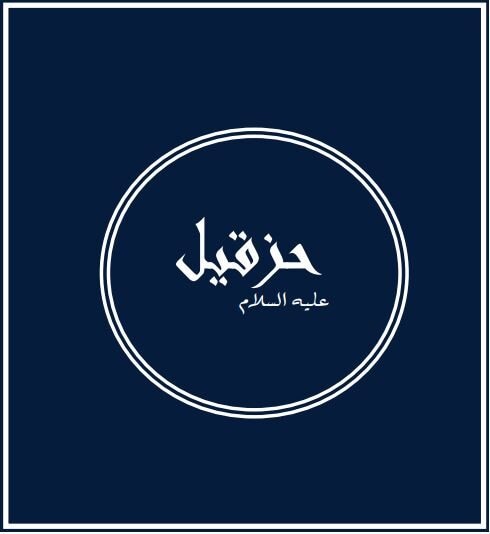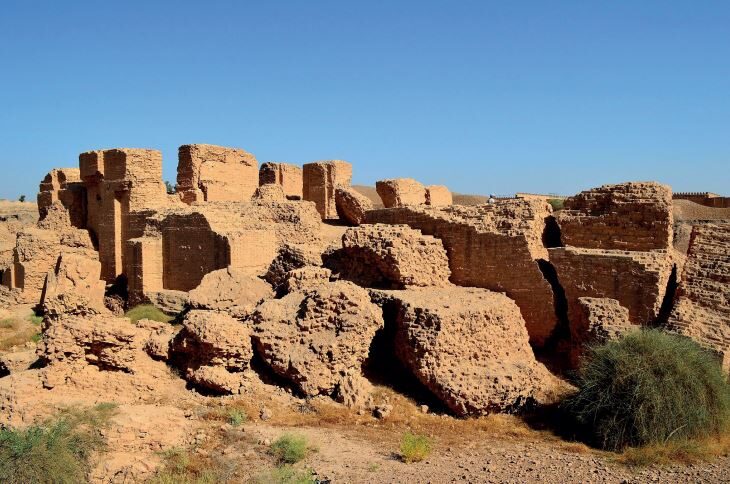Jalees Ahmad, Al Hakam

Dhu’l-Kifl (ذُو الۡكِفۡل), believed to be Ezekiel (حزقيل) (Five Volume Commentary, Vol. 4, p. 2110), was a prophet of God who preached against idol worship and the injustice among his people. He was among the Jewish exiles taken captive in Babylon. (Ezekiel, 1)
Ezekiel’sas name has been mentioned twice in the Holy Quran. (Surah al-Anbiya’, Ch21: V.86; Surah Sad, Ch.38: V.49)
Hazrat Mulseh-e-Maudra states, in light of Prophet Ezekiel’sas character, that some have concocted and attributed various accounts about Ezekielas that cannot be attributed to a prophet of God. It is plausible that such narrations are in fact alluding to another person. (Tafsir-e-Kabir, Vol.5, p.555; The Encyclopedia of Islam, New Edition, Leiden E.J. Brill, 1986, Vol. 2, p. 242)
The identity of Dhu’l-Kifl
Ezekielas has been mentioned along with other great prophets:
وَاِسۡمٰعِيۡلَ وَاِدۡرِيۡسَ وَذَا الۡكِفۡلِ ؕ كُلٌّ مِّنَ الصّٰبِرِيۡنَ
“And remember Ishmael, and Idris, and Dha’l-Kifl. All were of the steadfast.” (Surah al-Anbiya’, Ch21: V.86)
“The identity of Dhul-Kifl is wrapped in uncertainty. Muslim commentators of the Quran identify him with several persons, chiefly with Biblical Prophets. But the Prophet known by this name appears to be Ezekielas who is called Dhul-Kifl by the Arabs. There seems to exist a close resemblance between the words ذوالكفل and حزقيل (Ezekiel), both in form and meaning, the former word meaning ‘possessed of an abundant portion’ and the latter ‘God gives strength.’ Thus the two words seem to possess an identical significance.” (Five Volume Commentary, Vol. 4, p.2110)
Ezekielas, said to have been born around 622 BC, came from a well-known religious family. He spent the early part of his life in Jerusalem and by the age of 30, he was appointed by God and started to preach to his people against idol worship. (Tafsir-e-Kabir, Vol.5, pp. 555-556)
Ezekiel, son of Buzi, received a direct message from God while in the land of the Chaldeans near the river Chebar, and he was divinely inspired. (Ezekiel 1:3)
In the book of Ezekiel 2:3-5, we read that God tells him He is sending him to the “rebellious nation” of Israel to warn them of their sins as they “hath rebelled against me” and the judgement that will come upon them. (Ezekiel 2:3-5)
Ezekiel’sas link with Isaacas
In his book, Muhammadsa in the Bible, after quoting two passages from the Bible – Genesis 21:17-18 & 21:20-21 – Hazrat Musleh-e-Maudra explained that Prophet Abrahamas had two sons: Ishmaelas and Isaacas. Allah promised to bless and multiply their descendants. (See the article about Prophet Ishmaelas [Al Hakam, Issue 258] and Prophet Isaacas [Al Hakam, Issue 259]). Huzoorra then said, “From among them arose the Prophets, Mosesas, Davidas, Ezekielas, Danielas and Jesusas.” (Muhammadsa in The Bible, p.9)
About Ezekiel
As per Biblical literature, Ezekielas is counted among the top four major Prophets. (Tafsir-e-Kabir, Vol.5, 555) In light of the book of Ezekiel, it seems that it is the first and last book that is partly written by a prophet of God himself. (Tafsir-e-Kabir, Vol.5, p. 556)
Ezekielas often addressed himself as the son of Adam: “And he said unto me, Son of man, stand upon thy feet, and I will speak unto thee.” (Ezekiel, 2:1) “But thou, O son of man, behold, they shall put bands upon thee, and shall bind thee with them, and thou shalt not go out among them.” (Ezekiel, 3:25) This is a unique similarity found in Ezekielas, Jesusas, and Idrisas. (Tafsir-e-Kabir, Vol.5, p.556)
“Ezekielas is of particular importance in that after his time the Jews almost abandoned the outward [worship of] idolatry, which had so often recurred among them in earlier ages.” (Tafsir-e-Kabir, Vol. 5, 556)
Nebuchadnezzar’s siege of Jerusalem in 597 and the situation Prophet Ezekielas confronted
During Ezekiel’sas time, Babylon had emerged as the primary force in Western Asia, replacing Assyria, and Judah had recognised Babylon’s supremacy. However, “Jehoiakim, the King of Judah, under the influence of his evil councillors, revolted against the authority of Babylon, thus drawing upon himself the vengeance of Nebuchadnezzar, who successfully besieged Jerusalem in 597 and carried into exile many of her leading citizens, including Ezekielas and Jehoiachin, a king of three months’ standing – his father Jehoiakim having meanwhile died. Jehoiachin was succeeded by his uncle, Zedekiah, who for a time remained faithful to Babylon, but foolishly depending upon the support of Egypt, he renounced his allegiance to Babylon, an act which Ezekielas bitterly resented and denounced as treachery to Yahweh Himself. The result was that Jerusalem was invested by Nebuchadnezzar and, after a siege of eighteen months, was destroyed amid horrors untold. The Temple on which such a passion of love had been lavished was reduced to ashes and the people were deported to Babylon (586 B.C.).” (Five Volume Commentary, Vol. 4, p. 2110)
A vision of Prophet Ezekielas
The book of Ezekiel contains many prophecies. In fact, he foretold the annihilation and ultimate repair and rehabilitation of the Jews.
This has also been mentioned in Surah al-Baqarah:
“Or like him who passed by a town which had fallen down upon its roofs, [and] exclaimed, ‘When will Allah restore it to life after its destruction?’ Then Allah caused him to die for a hundred years; then He raised him, and said: ‘How long hast thou remained [in this state]?’ He answered, ‘I have remained a day or part of a day.’ He said: ‘Nay, thou hast remained [in this state] for a hundred years. Now look at thy food and thy drink; they have not rotted. And look at thy ass. And We [have done this] that We may make thee a Sign unto men. And look at the bones, how We set them and then clothe them with flesh.’ And when this became clear to him, he said, ‘I know that Allah has the power to do all that He wills.’” (Ch.2: V.260)
The ruined town alluded to in the verse is the one destroyed by Nebuchadnezzar, i.e., Jerusalem. (Also see, Bickerman, E.J. “Nebuchadnezzar And Jerusalem”, In Studies in Jewish and Christian History, (Leiden, The Netherlands: Brill, 2007))
Prophet Ezekielas was taken to Babylon with captives by Nebuchadnezzar. He, along with the captives, was made to pass by the fallen town, as per the tradition of that time, so that they might see the ruins of their city.
Pained to see this sight, Ezekielas asked God when it would be restored to life after its destruction; meaning when the children of Israel would come back to rebuild it. Upon this, God disclosed to him a vision that showed that the restoration of this city would take place after 100 years. (Five Volume Commentary, Vol.1, p.407)
Explaining the vision mentioned above, the Five Volume Commentary states:
“Ezekielas saw in a vision that he had died, remained dead for a hundred years and then had come back to life. As he was the representative of his people, his death signified the death of the Israelites. Thus God informed him through this vision that the children of Israel would remain in their state of captivity and lifelessness for a hundred years, after which a new life would be given them and they would return to inhabit their sacred city.” (Five Volume Commentary, Vol.1, p.407)
Prophet Ezekiel’sas dream or vision was confirmed to be true when Nebuchadnezzar invaded Jerusalem twice, first in 597 BC and then in 587 BC, culminating in the city’s destruction by 586 BC. This is probably the time when Ezekielas had his vision. Even though the city was rebuilt approximately a century later, the vision ultimately came to pass. (Five Volume Commentary, Vol. 1, p.407-408) However, Prophet Ezekielas did not live long enough to see the fulfilment of his vision, as he passed away in captivity in 570 BC at the age of 52. (Ibid., Vol.4, p.2111)
The vision of the Prophet Ezekielas has been mentioned in chapter 37 of his book.

Ezekielas, an admirer of Nebuchadnezzar
It is clear from a study of the Book of Ezekiel, that he held high regard and esteem for Nebuchadnezzar, the King of Babylon. Prophet Ezekielas believed that the King’s harsh actions against Egypt, Tyre, and the Israelites were warranted. Prophet Ezekielas attributed the downfall and plundering of Jerusalem to the wrongdoing and evil deeds of the Israelites. (Tafsir-e-Kabir, Vol.5, p. 556)
“He [Prophet Ezekielas], along with the Prophet Jeremiah, was in favour of supporting the Babylonian government and for this support, both these Prophets were condemned as traitors by the Jewish priests of the time, just as Jesus was condemned as a traitor for supporting the Roman government in the time of Titus, and the Promised Messiah in our own time was condemned as a traitor and a sycophant for preferring British rule in India to that of the Sikhs.” (Five Volume Commentary, Vol.4, p. 2111)
In Ezekiel’sas time, the Jews seem to have greatly prospered – and become a strong nation, but politically they were weakened. (Tafsir-e-Kabir, Vol.5, 558)
Hazrat Musleh-e-Maudra on the prophecy of Prophet Ezekielas
After discussing the Islamic system of economics in detail, Hazrat Musleh-e-Maudra, in The Economic System of Islam, then goes on to evaluate communism, pointing out the inherent contradictions that will lead to its downfall. He also presents three prophecies about the decline of communism in Russia, including one from Ezekielas, one from the Promised Messiahas, and one of his own.
After quoting chapters 38 and 39 of the book of Ezekiel, Huzoorra said that the passage described a prophecy made by Ezekielas over 2,500 years ago, which predicted that Moscow and Russia, represented by Meshech and Tubal, would become a powerful nation and attempt to subjugate other countries, including Persia. The prophecy warns that Russian imperialism will be even more dangerous than earlier forms of imperialism and that Russia will eventually dream of holding sway over Jerusalem, leading to God’s wrath and a rain of fire and sulphur that will destroy Russia’s power.
Huzoor said:
“To people who do not believe in prophecies, I would like to say that if there was no God who gave His Apostles fore-knowledge of mighty events, then who was it that told Ezekielas two thousand and five hundred years ago that Russia would embark upon a program of world conquest, aggression and aggrandisement, so that God’s wrath would be kindled against it and the punishment from heaven would leave its power in ruins. When we give due thought to this prophecy and the extraordinary manner in which it has come true in our own days, we are forced to conclude that God who conveys such tidings to His chosen servants really does exist. And if God does exist, and He gave to Ezekielas foreknowledge of these events, we must also bear in mind that God Almighty does not wish that the Communist system, which forms the basis of Russia’s political economy and social structure, should be permanently established in the world; and that its downfall is not very far away.” (Economic System of Islam [English], p. 133)

